
Gold 1944,185
|
EURUSD 1,1856
|
DJIA 27895,50
|
OIL.WTI 42,74
|
DAX 12871,28
|
|---|
More recently, no one believed that the price of oil would rise to at least $40 per barrel. Sure enough, after falling to negative values of -37$, the majority of analysts predicted average cost of black gold in 15$-20$ till the end of 2020. However, only 4.5 months are left till the end of this year. And we can try to look into the future.
OIL.WTI

Oil prices may rise to $60 per barrel in the first half of 2021 due to a shortage of crude on the market. This process may begin in the fourth quarter of 2020. Futures show that longer contracts (for the next year) are priced faster than current ones. This means that the major players are waiting for a significant increase in the value of black gold in 2021.
The key factors contributing to the growth of WTI quotations:
• Investors believe that the terms of the OPEC + transaction are followed by all its participants.
• Sharp decline in shale oil production in the USA and Canada
• Oil demand is expected to increase next year due to the containment of the COVID-19 pandemic.
There is one more important point to add. In the market usually happens exactly what no one expects. Nobody expected to see negative oil prices. That’s exactly how no one sees black gold around $60 today.
And what happens next?
A weekend is a time to distract from intraday trading (the market is closed) and to look at the world globally. 2022-2023 will be years of full recovery of the world economy. Theoretically, the demand for oil should continue to grow. But there is one problem and two Black Swans for oil workers.
The problem is that after oil reaches the price of $60, unfreezing of shale wells will start again. And the longer the oil price remains at this value, the more shale oil will appear on the market.
And two Black Swans:
1. New technologies. For example, highly cheapening shale oil production, as well as the widespread transition to electricity and green energy.
2. Changing the way of life of people and business. During the Coronavirus, we realized that it was not necessary to fly to a conference in Bangkok or Paris. Or to send specialists to foreign enterprises on business trips. Everything can be successfully done online. There are many such moments. It is quite possible that the demand for aviation fuel will not return to its previous level within a decade.
What’s waiting for us today?
01.50 Japanese GDP for 2Q
14.00 New York FBI Manufacturing Index for August
Important Notes on This Publication:
The content of this publication is for general information purposes only. In this context, it is neither an individual investment recommendation or advice nor an offer to purchase or sell securities or other financial products. The content in question and all the information contained therein do not in any way replace individual investor- or investment-oriented advice. No reliable forecast or indication for the future is possible with respect to any presentation or information on the present or past performance of the relevant underlying assets. All information and data presented in this publication are based on reliable sources. However, Bernstein Bank does not guarantee that the information and data contained in this publication is up-to-date, correct and complete. Securities traded on the financial markets are subject to price fluctuations. A contract for difference (CFD) is also a financial instrument with leverage effect. Against this backdrop, CFD trading involves a high risk up to the point of total loss and may not be suitable for all investors. Therefore, make sure that you have fully understood all the correlating risks. If necessary, ask for independent advice.
